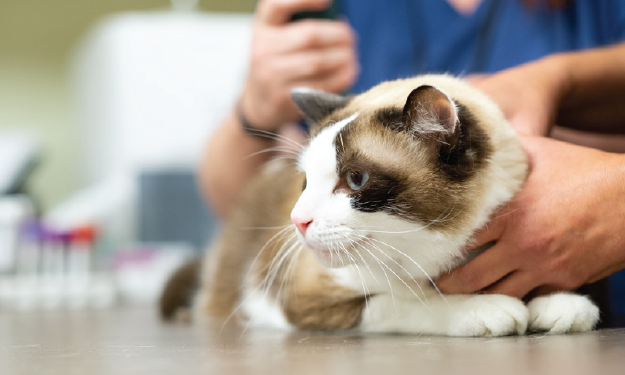Salivary Gland Cancer in Dogs & Cats

What are Salivary Gland Tumors?
Salivary gland tumors are considered rare in the dog and the cat. They are mostly reported in older patients with no specific breed or sex predilection in dogs. In cats, there may be a correlation to these tumors and male Siamese cats. The vast majority of these cancers are adenocarcinomas; however, other histologic types have been reported. They can arise from any major or minor accessory glands throughout the oral cavity. The mandibular salivary gland is the most commonly affected.
What are the Symptoms?
Symptoms are often non-specific and can include halitosis (bad breath), dysphagia, or a unilateral, firm, painless swelling of the neck, base of the ear, upper lip, or tongue. The location of the swelling depends on what gland is involved.
How is it Diagnosed?
Definitive diagnosis usually requires a biopsy. A fine needle aspirate is useful in distinguishing cancer vs. noncancerous etiology. A CT scan is useful to help determine the extent of disease and infiltration into surrounding structures.
What are the Treatment Options?
- Surgery: Surgery is the most common treatment used for local control for oral tumors. The type of surgery depends on the tumor location. In some cases, combining surgery with radiation therapy may be needed depending on the extent of the tumor on advanced imaging.
- Radiation Therapy: Post-operative radiation therapy has resulted in good local control and prolonged survival in a very limited number of patients. Definitive vs. palliative radiation protocols may both be available options, and the benefits vs. risks associated with these protocols can be discussed with one of our radiation oncologists.
- Chemotherapy: The role of chemotherapy for salivary tumors is truly unknown. Based on biopsy findings, systemic chemotherapy may be recommended in patients with concern for potential systemic spread.
- Medical Management: Medical management of oral tumors depends on what the clinical signs are, but often involves antibiotics to treat secondary infections, and/or anti-inflammatory drugs.
What is the Prognosis?
There is limited data on the prognosis for salivary gland cancer. A limited number of cases suggest that aggressive local therapy can permit long term control and survival. Incomplete surgical removal without adjuvant radiation therapy ultimately leads to local recurrence. The long-term outcome in cats with salivary gland tumors tends to be less than dogs.